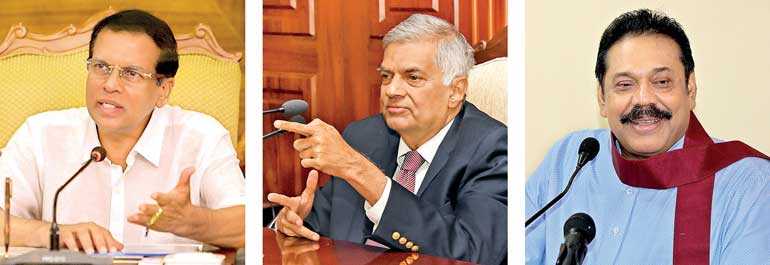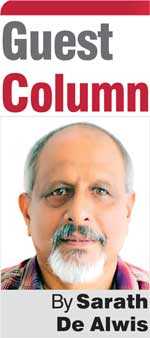Sunday Feb 15, 2026
Sunday Feb 15, 2026
Friday, 16 November 2018 00:00 - - {{hitsCtrl.values.hits}}


This is an easy-peasy, elementary effort of an ordinary citizen to comprehend the mad scramble for power among the political class.
It is undertaken in the belief that the crisis we face is an opportunity to reject the family kleptocracy of Mahinda Rajapaksa and the corporatist kleptocracy of Ranil Wickremesinghe.
We must treat President Maithripala Sirisena kindly. We the people promoted the man beyond his capacity. For three years we were either complicit in or were indifferent to the quiet build-up of a pseudo presidential persona that depicted him as staggeringly successful beyond his worth.
Any person with a cursory understanding of the Freudian theory of personality – that of id, ego and super ego will forgive him for his present day penchant to exude an atrocious arrogance that far exceeds his achievements.
Silver lining
There is a silver lining in all this madness. A silent, substantial and sane segment of our polity now realise the stockpile of wisdom contained in the rhetoric used by Dr. N.M. Perera to warn us on the inherent peril of the executive presidency. ‘What if a mad man becomes the president?’ 
That NM’s virologist nephew Tissa Vitharana has been bitten by the loony virus is a subject for another day.
We often make the mistake of interpreting the polarisation of a few and select power groups or political parties as reflecting a great polarisation of society as a whole.
For example, Mahinda does not represent Sinhala Buddhist opinion. He has most of the Sangha in his wallet. We confuse the two.
Mahinda gave diplomatic passports to prominent Buddhist monks. For the life of me, I do not understand why Buddhist prelates need privileged passports to preach the Dhamma either here or abroad.
The positive side of the current madness is that there is a discernible polarisation of forces between the modern and the tribal. The principled stand of political formations representing ethnic minority interests with enlightened democratic segments of the ethnic majority is a sign that at long last the seeds of a true post-colonial nation state are taking root in the fertile soil of freedom and human dignity.
Let us go back to 8 January 2015. The rainbow coalition had a simple objective. It rejected a state that was a kleptocracy and a state that sanctioned murder, abductions and disappearances. More than the kleptocracy part, the fear and excesses of the deep state transcended all other societal fault lines communal, economic and ethnic. The successor state that was installed by the good governance enthusiasts did not sanction murder, abductions and disappearances.
But the kleptocracy remained intact. It was far too entrenched. The successors were far too greedy to make the structural reforms that would make a difference. The story of SriLankan Airlines, the bond boondoggle, and legal gymnastics of two President’s Counsel in the Ranil Wickremesinghe Cabinet to stall the probe on Avant-Garde bounty hunters are eloquent examples of the double dealings of the reformers.
In the past three years, State-sanctioned murders have not been conclusively resolved. The parents of the eleven youth who vanished while in the custody of the navy are hoping for closure in vain. The Admiral who shielded one of the prime suspects dressed in his grandiose white is exuberantly celebrating his proprietorial grip on the allegiance of a peasant mind incapable of discerning the thin line separating perfidy and patriotism.
That said, this worrisome situation should not make us sceptics about democracy. The outcry, the tangible consensus against these problems as mentioned above and not mentioned due to space tell us that that there is indeed something about democracy that is worth mobilising for.
At this moment of democratic peril, we must resolve to reinvent and expand our democracy.
Chaos in Parliament is chaos that we created
We don’t need to elect buffoons who after elections pander to the whims and ideocracies of ‘Mahanayakes’ cocooned in their tribal enclaves.
The purported Minister of Buddha Sasana according to today’s news reports has agreed with the prelate of Asgiriya monastery that we must not allow foreigners to interfere in our affairs. May be Gammanpila wants the Australian investor to remain mum on his charge of stock market swindle.
Our democracy begins and ends with the nebulous notion of an electoral representative democracy. It relies on quite valuable but extremely brittle set of institutions, which cling on to the notion that the elected Political class somehow know better than their electors.
The elected parliamentarians and in this instance our elected president does not seem to have much faith in the citizens’ capacity to make political decisions.
The challenge we confront is simple and straight forward. We must somehow survive this crisis and form a credible caretaker government and hold a general election in which we the people can decide on representatives who will offer alternative practices enabling genuine democratic participation.
The great war hero is exposed in all the nakedness of a cat burglar stealthily stealing the expressed will of the people. Caught with the goods, he has now turned witness for the prosecution and wants a general election.
Thanks to the President’s puerile and precipitate action we have an opportunity to rethink and reframe our idea of democracy.
We must abandon this monstrous model
There is no way we can restructure it. We must at the next general election, put forward a constitutional model that does not promise but guarantees equality, freedom and the space for ordinary citizens to have a meaningful influence on politics. We must reject both, neo liberal economics and free market economics. Markers need intervention by the state. There is nothing vulgar about State Owned Enterprises, provided the vulgar are kept out of management.
It is an urgent and immediate task. I live in Battaramulla. Every day I pass the edifice that houses the Ministry of Megapolis Development now taken over by the charlatan son of Philip Gunewardene, father of the revolution that never arrived.
I must make an effort to avoid a monstrous billboard with an obscene picture of Dinesh Gunewardene and call for the Boralugoda lion roar.
The task of rethinking our democracy is pressing. We are now witnessing the brazen, arrogant and aggressive attempt by a gang that openly attempted to hijack the Parliament to take command and control of the ‘language of democracy’ to capture power and restore their rent seeking ministerial privileges.
They involve ‘The People’ to subvert opposition to their machinations. The recent capture of State media institutions demonstrate their capacity to offer more undemocratic solutions to real and imagined problems. They seek to divide our society on parochial lines and undermine the climate of reconciliation that was clumsily but determinedly pursued in the last three years.
You must remember how Mahinda Rajapaksa set up the family business.
Mahinda Rajapaksa is not a selfish man. He institutionalised the exploitative privileges and perks of his team from base to the top of the pyramid. Despite his great charisma, this episode has made him a political clown. He has paid a high price. He has lost all political legitimacy. This is the beginning of the end of the Mahinda Rajapaksa folk legend.
Now we must focus on our President whom we elected as the common candidate.
His humility and his humble life trajectory were his USP – ‘the unique selling proposition,’ the term used by professional marketeers in marketing FMCG – Fast-Moving Consumer Goods – the stuff that has a limited shelf life.
In fairness we must remember that he was proud of his achievement or destiny. At some point he concluded that he himself singlehandedly reached the hybrid of an Abraham Lincoln and Nelson Mandela. That is beside the point.
He certainly has a deep-seated antagonism towards Ranil Wickremesinghe, the UNP Leader, who paved way for him to become president. The problem is that halfway through they both got confused. The President stopped being grateful. His Prime Minister never ceased crying over his spilt presidential milk.
When the President complains about the cultural chasm between him and the Prime Minister, my conscience dictates me to agree with him.
First, Ranil Wickremesinghe does not speak the Sinhala that Maithripala Sirisena speaks. Second, no matter how humble you are, there is a limit to tolerating the uppity know all attitude of Ranil Wickremesinghe. It is not an act that is human possible unless your fate, interest or wellbeing is dependent on the UNP Executive Committee.
Since defeating the no confidence motion against him, Prime Minister Ranil Wickremesinghe did not bother to mend fences. Newspapers periodically reported that the President got mad over some Cabinet paper or other.
In high pressure politics, getting mad over something is not unusual. Staying mad with somebody with whom you have fundamental differences is also not unusual. Getting mad is no big deal. Going actually, really and truly mad is catastrophically insane.